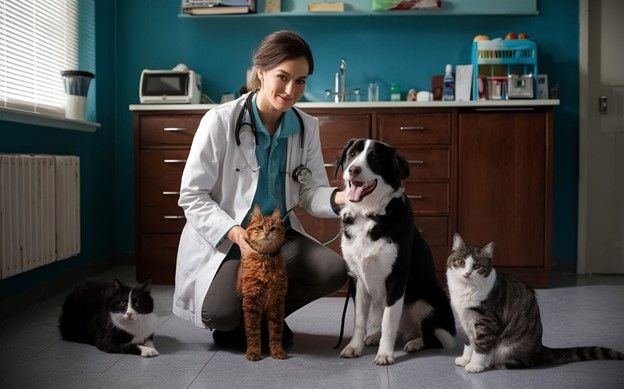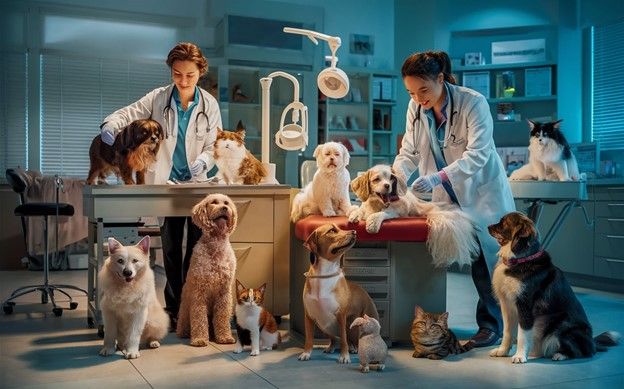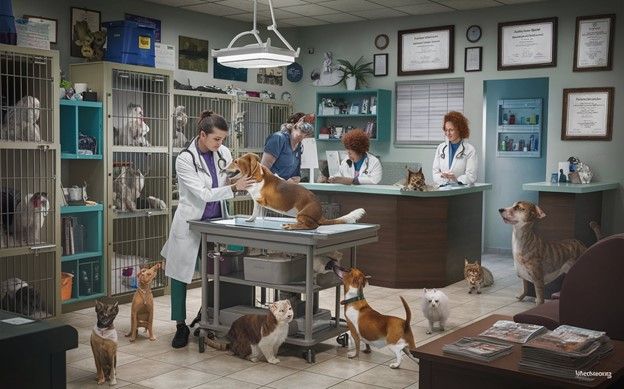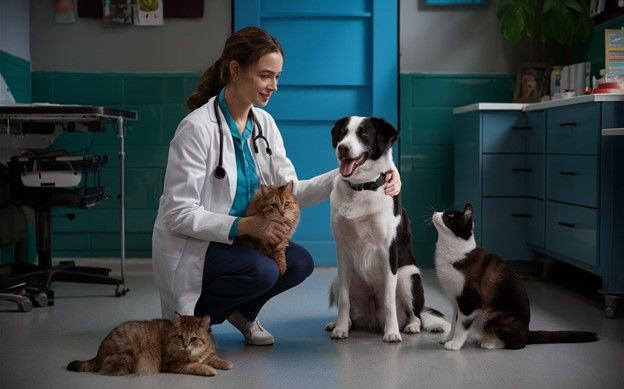

Starting a veterinary practice can be expensive. Getting a business loan feels impossible when high startup costs meet stringent credit checks.
Fortunately, there are pathways to secure a business loan for your veterinary practice without a credit check.
Understanding the options can ease the financial burden, whether you’re just starting or looking to expand.
Many lenders offer unique financial products tailored to veterinarians. These options often bypass traditional credit checks and focus more on your practice’s revenue and growth potential.
Knowing where to look can make all the difference from unsecured loans to alternative financing strategies.
Alternative financing solutions provide flexibility and accessibility. Many companies offer veterinary financing programs catering to pet medical care, surgery, and general practice needs.

No credit check loans can be an option for those who need funding without undergoing a credit approval process.
They cater to individuals with poor credit history and are often offered by alternative lenders online.
No credit check loans are designed to provide funding without a traditional credit approval process. Unlike conventional loans, they do not require a credit history check.
Online and alternative lenders often offer these loans, making them quicker and easier to obtain. This type of loan is especially beneficial for those with low credit scores who might not qualify for standard bank loans.
These loans are usually available in smaller amounts compared to traditional loans. They may come with a fixed fee instead of an interest rate, and the funding process is typically fast.
Pros:
Cons:

Understanding your veterinary practice’s specific needs is essential. By evaluating your current capital and estimating the costs of expanding or establishing a new practice, you can create a clear business plan to ensure positive cash flow.
Assessing the current capital for an existing practice involves reviewing financial statements, savings, and any existing loans. Veterinary practice owners need to identify available liquid assets.
They should list down all equipment, inventory, and other assets that may have value.
Creating a budget for ongoing expenses such as payroll, rent, utility bills, and supplies is also crucial.
Veterinary practice owners must know the costs of maintaining the practice. A clear overview of expenses helps determine how much additional capital is needed.

Estimating the costs of expanding a new practice requires detailed planning. Costs may include purchasing new equipment, hiring additional staff, or remodeling current facilities.
Veterinary practice owners should list expected one-time and recurring expenses.
Consulting with contractors and suppliers can give a more accurate estimate. Veterinary practice owners can use these realistic figures to form a business plan.
Recognizing these costs is essential to apply for the appropriate amount of funding.
Analyzing projected cash flow involves forecasting future income and expenses. Veterinary practice owners must consider their current revenue streams and how they might grow.
They must estimate how much the expansion will contribute to the overall income.
Creating monthly or quarterly cash flow forecasts helps understand when the practice may experience financial highs and lows.
This assists in planning and ensuring that there is always enough cash flow to cover expenses. With accurate cash flow analysis, making informed financial decisions becomes easier.
Veterinary practice owners can choose from various lending products that cater to their needs. These include traditional bank loans, online lenders, SBA loans, and equipment financing.
Traditional lenders like banks and credit unions offer products such as business term loans and lines of credit.
They are known for competitive interest rates and long-term relationships with businesses. However, the application process can be lengthy and involve stricter credit requirements.
Online lenders provide quicker approval times and more flexible terms. They may be more willing to approve loans with less stringent credit checks.
Some popular options include working capital loans and merchant cash advances. These can be processed faster, but might come with higher interest rates than traditional banks.
If you’re ready to get started, call us now!
The Small Business Administration (SBA) offers several loan programs that can benefit veterinary practices. SBA loans often have lower interest rates and longer repayment terms than conventional loans. The SBA 7(a) loan is popular for purchasing, refinancing, or expanding a practice. It can be used for various needs like real estate, equipment, or working capital.
SBA microloans provide smaller financing, which might be ideal for starting a practice or purchasing necessary supplies.
These loans often come with requirements, like a personal guarantee, but offer favorable terms for small businesses.
Equipment financing is designed to help veterinarians purchase essential medical equipment, such as diagnostic machines, surgical tools, and office furnishings.
Lenders offering equipment financing often use the equipment itself as collateral, which can reduce the need for a strong credit history.
Leasing options enable practices to upgrade equipment regularly without the high upfront costs. Monthly lease payments can be more manageable for new or expanding practices.
At the end of the lease term, there may be options to purchase the equipment, renew the lease, or upgrade to newer technology.
These options include various lenders and financing solutions catering to veterinary practices’ different needs and circumstances.
Preparing the necessary documentation and understanding the loan terms are crucial steps to getting a business loan without a credit check for your veterinarian practice.
This will help ensure a smooth process and the success of your application.
Start by gathering essential documents. Lenders may request your business plan, financial statements, and proof of revenue.
A detailed business plan includes an overview of your practice, services offered, and growth strategies.
Financial statements, such as income, balance sheets, and cash flow statements, provide insights into your financial health practice.
Proof of revenue can be shown through bank statements from your business checking account from previous months.
Have these documents ready in organized folders. Doing so makes the application process easier and shows you are a prepared and responsible borrower.
Before signing any loan agreement, understand the terms and conditions clearly. Look into the interest rates, fees, repayment schedules, and any penalties for late payments.
Knowing whether the loan has a fixed or variable rate is important. Fixed rates mean your payments remain consistent, while variable rates can change over time.
Additionally, be aware of the total cost of the loan. Calculate the total amount you’ll pay by the end of the term, including fees.
Double-check if there are any prepayment penalties if you plan to pay off the loan early.
Knowing these specifics helps you make an informed decision and ensures the financing aligns with your veterinarian practice’s financial planning and goals.
Veterinarians have various options when seeking financial products to fund their practices.
These include business lines of credit, short-term and long-term loans, and specialized veterinary business loans.
A business line of credit provides veterinarians with flexible access to funds as needed. This revolving credit allows for withdrawals up to a set limit, similar to a credit card. Interest is only charged on the amount borrowed.
Benefits:
Options:
Short-term loans are ideal for immediate financial needs and are typically repaid within three to 18 months. Long-term loans, in contrast, have extended repayment periods, which are suitable for large investments.
Short-Term Loans:
Long-Term Loans:
Specialized loans are tailored for veterinary practices and cater specifically to industry needs. These may offer better terms and more relevant financing options.
Advantages:
Examples:
Understanding these options helps veterinarians choose the best financial product to efficiently support and grow their practices.
If you’re ready to get started, call us now!
Alternative financing strategies can provide valuable options for veterinarians to secure funds without a credit check.
Crowdfunding, investor financing, partnerships, and private lending are key methods to consider.
Crowdfunding allows veterinarians to raise capital online by engaging with a community of backers. This method is ideal for those with a loyal customer base willing to support the practice’s growth.
In contrast, investor financing involves seeking out private investors or venture capitalists interested in funding startups or expanding businesses.
Investors often provide significant sums in exchange for equity or partial ownership. This can benefit those who need substantial funds and are open to sharing ownership.
Partnerships with another business or individual can provide access to additional resources and expertise. Partnerships involve sharing responsibilities, profits, and decision-making powers.
This method can reduce the financial burden on a single owner and bring in new skills and perspectives that can drive the business forward.
Private lending offers another viable option. Unlike traditional banks, private lenders often provide more flexible repayment terms and are willing to finance businesses with bad credit or less established financial histories.
This method usually involves higher interest rates, but the speed and ease of access make it an attractive choice for many veterinarians.
Effective management of loan repayment for your veterinarian practice ensures financial stability.
Key points include setting up manageable repayment terms and exploring options for refinancing or consolidation.
When establishing repayment terms, it’s important to negotiate a plan that aligns with your cash flow.
For example, some lenders offer fixed rates and structured installments, making it easier to predict monthly expenses.
Consider loan amounts and their corresponding interest rates. Veterinary practices often have seasonal fluctuations, so that a flexible repayment schedule could be beneficial.
Ensure monthly payments are realistic and won’t strain your practice’s finances. Automating payments can also help avoid missing due dates and incurring penalties.
Refinancing can lower monthly payments or secure better interest rates. For businesses with multiple loans, consolidation might simplify repayment by combining them into a single loan.
Research various lenders to find refinancing options with more favorable terms. Check if the new loan offers a lower interest rate or if it can extend the repayment period.
Consolidation reduces the hassle of managing multiple loans and might improve cash flow by lowering monthly repayment.
By staying informed and proactive, you can manage loan repayment efficiently, ensuring your practice remains financially healthy.
Securing a business loan for a veterinary practice without a credit check can be challenging.
However, healthcare professionals can access specific resources and loan programs tailored to their needs.
Healthcare startups, including veterinary practices, often face high initial costs. These costs can be related to equipment, construction, or leasing space.
Some lenders offer specialized loans for healthcare startups that cater specifically to the needs of medical practice owners.
For example, SBA loans are popular among healthcare professionals as they offer lower interest rates and longer repayment terms.
While traditional SBA loans require credit checks, certain microloans through the SBA or other federal agencies may have more lenient credit requirements.
Common Loan Options:
Important Considerations:
Veteran-Specific Loan Programs
Veterans who are healthcare professionals have additional loan programs available to them.
These programs are designed to support veterans starting or expanding their veterinary practices.
One option is the SBA Veterans Advantage program, which provides fee reductions on specific loans.
Another option is the Veterans Business Outreach Center (VBOC), which offers resources and guidance to veteran small business owners.
Veteran Loan Benefits:
Program Examples:
These programs help veterans overcome financial barriers and succeed in owning and operating their veterinary practices.
In the fast-paced world of healthcare, every moment counts, and so does every dollar. At Small Business Assets & Capital, we understand the pressure to keep your practice ahead financially while delivering top-notch patient care.
Don’t let cash flow challenges disrupt your service or stall your growth. With tailored financing options like our Medical Equipment Financing and Healthcare Lending, you can maintain and even expand your practice’s capabilities without the burden of immediate full expenses.
Whether upgrading technology, expanding your service offerings, or simply smoothing out the bumps in your cash flow, we’re here to ensure your practice thrives in any economic climate.
Don’t wait for financial strains to become emergencies—. Apply today and keep your focus where it truly belongs: on your patients.
What options are available for financing a veterinary clinic without a credit check?
Veterinarians can consider options like online lenders offering cash or merchant cash advances. These types of financing use future sales projections rather than credit scores to determine eligibility. Another option is working with specialty lenders who cater specifically to veterinary practices.
How can a veterinarian secure a small business loan without a credit history?
Veterinarians with no credit history can secure loans by presenting a strong business plan and showing proof of steady income or high revenue. Lenders may also consider the value of collateral or the potential earnings of the practice.
What are the recent changes to SBA loan limits, and how do they affect veterinary practice financing?
Recent changes to SBA loan limits have increased the borrowing capacity for small businesses. This means veterinarians can now obtain larger amounts of funding through programs like the SBA 7(a) loan, which offers up to $5 million, or the SBA 504 loan, designed for major fixed asset purchases.
Is it possible for veterinarians to obtain business loans for self-employment without a credit history?
Yes, veterinarians can obtain business loans for self-employment without a credit history. They can work with lenders who do not base their approval solely on credit scores. Instead, these lenders may consider revenue, business stability, and potential earnings.
What are the prerequisites for a veterinarian to be eligible for small business funding without traditional credit checks?
Eligibility for such loans often requires proving the business’s ability to generate consistent revenue. Lenders may ask for detailed financial statements, business plans, and sometimes collateral. Specialty lenders may also require a demonstration of the business’s growth potential and market positio